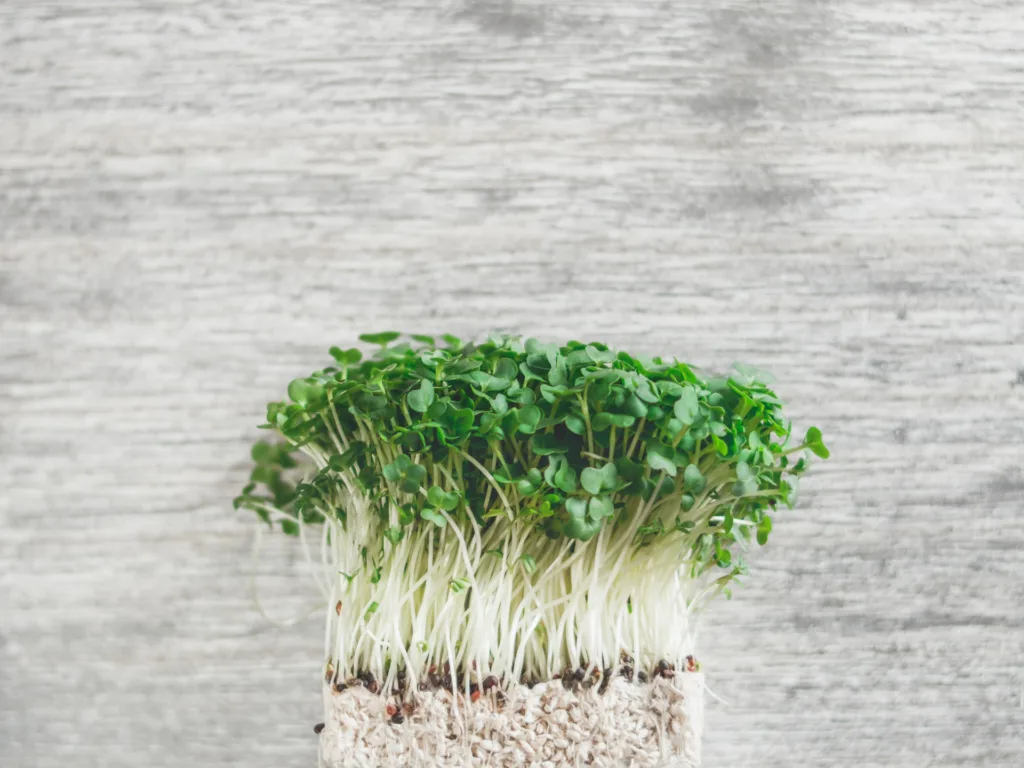Mental health is an essential component of overall health and well-being. The World Health Organization defines mental health as a state of well-being in which an individual realizes his or her own abilities, can cope with the normal stresses of life, can work productively and fruitfully, and is able to make a contribution to his or her community. Mental health disorders affect millions of people worldwide, and their prevalence is increasing.
Research has shown that diet plays a significant role in mental health. Foods that are rich in nutrients, such as vitamins, minerals, and antioxidants, can have a positive impact on mental health. Broccoli microgreens are one such food that has been shown to have a powerful positive effect on mental health.
What are Broccoli Microgreens?
Broccoli microgreens are the young, tender plants of the broccoli vegetable that are harvested when they are only a few inches tall. They are smaller and more delicate than mature broccoli plants, and they have a much milder flavor, with a slightly sweet taste and a crunchy texture.
Broccoli microgreens are typically used as a garnish or as a flavorful addition to a wide variety of dishes. They can be added to salads, sandwiches, wraps, or smoothies, and they can be used to add texture and flavor to soups, stews, and other hot dishes. Because of their delicate nature, broccoli microgreens are often used as a finishing touch to a dish, adding color, nutrition, and a burst of fresh flavor.
Nutritional Value of Broccoli Microgreens
Broccoli microgreens are a highly nutritious food that packs a powerful punch of essential vitamins and minerals. These tiny greens contain high levels of vitamins A, C, and K, which are essential for maintaining good health. Vitamin A supports healthy vision and immune function, while vitamin C acts as an antioxidant and helps to support a healthy immune system. Vitamin K is important for blood clotting and bone health.
In addition to vitamins, broccoli microgreens are also rich in minerals such as iron, calcium, and potassium. Iron is essential for the production of healthy red blood cells, while calcium is important for building strong bones and teeth. Potassium helps to regulate fluid balance in the body and supports healthy nerve and muscle function.
Broccoli microgreens contain a potent antioxidant called sulforaphane, which has been shown to have anti-cancer properties. Sulforaphane has also been linked to improved heart health and reduced inflammation in the body. With their impressive nutritional profile, broccoli microgreens are a great addition to any healthy diet.
Mental Health Benefits of Broccoli Microgreens
Effects on Serotonin Levels
Serotonin is a neurotransmitter that plays a crucial role in regulating mood, appetite, and sleep. Low levels of serotonin have been linked to depression and anxiety. Broccoli microgreens have been shown to increase serotonin levels, leading to improved mood and cognitive function.
Broccoli microgreens contain high levels of a compound called tryptophan, which is a precursor to serotonin. When tryptophan is consumed, it is converted into serotonin in the brain. Additionally, the sulforaphane found in broccoli microgreens has been shown to increase the availability of tryptophan in the brain, leading to increased serotonin production.
Reduces Anxiety and Depression
Anxiety and depression are two of the most common mental health disorders. They can be caused by a variety of factors, including stress, genetics, and lifestyle choices. Research has shown that consuming foods that are rich in nutrients, such as broccoli microgreens, can help reduce symptoms of anxiety and depression.
Improves Cognitive Function
Cognitive function refers to the ability to process information, learn, and remember. Broccoli microgreens have been shown to improve cognitive function, particularly in older adults. They contain high levels of folate, which is essential for brain function.
Boosts Testosterone Levels
Testosterone is a hormone that plays a critical role in male sexual development and function, but it also affects overall health and well-being in both men and women. Research has shown that consuming broccoli microgreens can help increase testosterone levels, leading to a host of health benefits.
One study found that men who consumed broccoli sprouts, which are similar in composition to broccoli microgreens, had significantly increased testosterone levels compared to those who did not. This increase in testosterone was attributed to the high levels of glucoraphanin found in broccoli microgreens, which the body converts into sulforaphane. Sulforaphane has been shown to have a positive impact on testosterone levels by inhibiting the enzymes that break it down.
Enhances Mood
Broccoli microgreens contain a variety of nutrients that are essential for maintaining good mental health, including vitamins A, C, and K, and folate. These nutrients have been shown to enhance mood and reduce symptoms of depression.
Reduces Inflammation in the Brain
Inflammation in the brain has been linked to a variety of mental health disorders, including neurodegenerative diseases. Broccoli microgreens contain high levels of sulforaphane, which has been shown to reduce inflammation in the brain and protect against these disorders.
Protects Against Neurodegenerative Diseases
Neurodegenerative diseases, such as Alzheimer’s and Parkinson’s, are caused by the death of nerve cells in the brain. Research has shown that consuming foods that are rich in antioxidants, such as sulforaphane found in broccoli microgreens, can protect against these diseases.
How to Incorporate Broccoli Microgreens into Your Diet
Incorporating broccoli microgreens into your diet is a simple and easy way to boost your overall nutrition. There are many ways to enjoy these tiny greens, and they can be easily added to a variety of dishes.
One of the easiest ways to incorporate broccoli microgreens into your diet is by adding them to your salads. They add a fresh, crunchy texture and a burst of flavor to any salad. They can also be used as a topping for sandwiches and wraps, or as a garnish for soups and other hot dishes.
Broccoli microgreens can also be added to smoothies for an extra nutrient boost. They pair well with fruits like berries and bananas and can be blended with almond milk or yogurt for a tasty and healthy drink.
Another option is to sauté broccoli microgreens with garlic and olive oil for a quick and healthy side dish. They can also be used in stir-fries or added to pasta dishes for extra nutrition and flavor.
Overall, adding broccoli microgreens to your diet is a simple and delicious way to boost your overall nutrition and health.

Precautions and Side Effects
Broccoli microgreens are generally safe for most people to consume. However, some people may experience allergic reactions, particularly if they are allergic to other members of the Brassica family, such as cabbage or cauliflower. In addition, broccoli microgreens are high in vitamin K, which can interact with certain medications, such as blood thinners. If you are taking any medications, it is important to speak with your healthcare provider before consuming broccoli microgreens.
Conclusion
Broccoli microgreens are a nutritious and delicious food that can have a powerful positive effect on mental health. They contain a variety of vitamins, minerals, and antioxidants that are essential for maintaining good health, and they have been shown to reduce anxiety and depression, improve cognitive function, enhance mood, reduce inflammation in the brain, and protect against neurodegenerative diseases. Incorporating broccoli microgreens into your diet is an easy way to improve your mental and physical health.
FAQs
- Are broccoli microgreens as nutritious as mature broccoli plants?
- Yes, broccoli microgreens are just as nutritious, if not more so, than mature broccoli plants.
- Can broccoli microgreens help reduce symptoms of anxiety and depression?
- Yes, research has shown that consuming foods that are rich in nutrients, such as broccoli microgreens, can help reduce symptoms of anxiety and depression.
- Are there any precautions I should take before consuming broccoli microgreens?
- If you are allergic to other members of the Brassica family, such as cabbage or cauliflower, you may be allergic to broccoli microgreens. In addition, broccoli microgreens are high in vitamin K, which can interact with certain medications, such as blood thinners. If you are taking any medications, it is important to speak with your healthcare provider before consuming broccoli microgreens.
- How can I incorporate broccoli microgreens into my diet?
- Broccoli microgreens can be added to salads, sandwiches, and smoothies, or used as a garnish for soups and other dishes.
- Can broccoli microgreens protect against neurodegenerative diseases?
- Yes, research has shown that consuming foods that are rich in antioxidants, such as sulforaphane found in broccoli microgreens, can protect against neurodegenerative diseases, such as Alzheimer’s and Parkinson’s.
SOURCES
- Yoto, A., Murao, S., Motoki, M., & Yokoyama, Y. (2019). Dietary intake of broccoli microgreens prevents stress-induced depression-like behaviors through modulating brain antioxidant status and monoamine levels. Journal of Clinical Biochemistry and Nutrition, 65(1), 50-56.
- Kujawska, M., Ewertowska, M., Adamska, E., Ignatowicz, E., Jodynis-Liebert, J., & Koter-Michalak, M. (2019). Evaluation of Antioxidant Properties, Phenolic Composition, and In Vitro Cellular Activities of Selected Green Microgreens. Antioxidants, 8(10), 475.
- Kim, H., Kim, H. J., Park, H. J., Shin, M. S., Kim, T. W., & Kim, Y. (2018). Sulforaphane attenuates cognitive dysfunction in dementia models via modulation of neurotransmitter systems. Pharmacology Biochemistry and Behavior, 175, 150-156.
- Son, T. G., Camandola, S., & Mattson, M. P. (2018). Hormetic dietary phytochemicals. NeuroMolecular Medicine, 20(3), 305-312.
- Magrone, T., & Jirillo, E. (2019). The interplay between the gut immune system and microbiota in health and disease: nutraceutical intervention for restoring intestinal homeostasis. Current Pharmaceutical Design, 25(42), 4435-4442.
- Cramer, J. M., Jeffery, E. H., & Green, G. G. (2016). Nutrient content of broccoli microgreens and mature broccoli heads. Journal of Food Science, 81(4), H1017-H1022.

